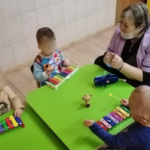Is Russian repentance possible?

The only pity is that neither me nor you to
Will have to live in this beautiful time
N. A. Nekrasov
Based on personal contacts, I will conclude that it is not worth hoping for the Russians to admit their guilt for the war in Ukraine, for the colonial policy towards the small peoples of their country, for centuries-old chauvinism, etc. The irritant necessary to awaken the Russians is too weak today. It is weak even to just think about the situation, and to take care, get excited and shudder in horror for what he has done – this is not even close. So far, the state machine is working smoothly: propaganda brainwashes, state security monitors the dissatisfied and isolates them in a timely manner, ousts them abroad or liquidates them. Rosgvardia in a combat position is waiting for a signal to use special means against possible protesters. In addition, Kremlin still has money to toss it to the layman, who lives from salary to salary, who does not look far ahead, and is content with affordable low-grade pleasures. Until the moment of catharsis, it is a long way – in the literal, figurative and military sense.
An interesting view of the problem was expressed by Danylo Tkachenko, one of the most prominent Russian photo artists, who received the World Press Photo prize and many other professional awards. In Russia, he was put on the international wanted list, a criminal case was initiated against him: Tkachenko planned to remotely set fire to blue and yellow smoke bombs so that for the participants in Moscow parade on May 9, 2022, the air would turn into the flag of Ukraine. The artist was betrayed, the special operation failed, he had to flee abroad. Further, a direct speech by D. Tkachenko, “Everything that happens is terrible, but, probably, everything happens the way it should happen. It is positive that the 20-year stagnation in Russia has ended. There was a feeling that it was impossible to change something, but now there is hope for change. Of course, it is scary that these changes will be difficult. But there is movement towards something new…”
Drawing parallels with the repentance of the Germans after WWII, it should be remembered that the reversal – unambiguous and final – occurred not when the leading humanist philosophers of Germany derived the formula of guilt and responsibility of all citizens of the Reich for military atrocities, but when W. Brandt in Warsaw on his knees asked for forgiveness from the people of Poland. “Over the abyss of German history, feeling the weight of the millions killed, I did what people do when words alone are not enough,” Brandt later wrote in his memoirs.
Looking back, many historians agree that Brandt’s policy of rapprochement was a step on the long road to German reunification, which ended in 1990. But before that, there was a long period of understanding by the Germans of the role of Germany in the war, the place of every German citizen, personal guilt, responsibility, ways of confessing their guilt, repentance, in the end.
Unfortunately, it is absolutely too soon to talk about any symbols of Russia’s reconciliation with those who suffered from its humiliation, cruelty and deceit. None of the Russians is ready or plans to shed hot tears of insight. The state of Russian public thought at the moment can be described by the words “taken aback”, “stunned”. Russian society, in some confusion, is fussily looking for ways to explain the situation and justify the reasons for the failures on the external military and internal international front. On the outside, it doesn’t work out very well with Ukraine and the Armed Forces of Ukraine, and on the inside, the small peoples of the Russian Federation suddenly started talking about their rights. Who would have thought, yesterday on all TV channels they talked about the eternal friendship and fraternal devotion of dozens of the country’s national minorities, and today there are people who call themselves national democrats and call for secession from Russia. And people start listening to them!
Therefore, it will be possible to talk about the hypothetical possibility of admitting guilt by Russians forty years after the disintegration of the empire and the emergence of new national states on its former territory. When it dawns on them that the Russian Reich is not eternal, that it was going the wrong way in the wrong direction, that all of us, Russians, where to some extent guilty of this movement towards the abyss. That the new generations of Russians need to choose a different path, and that they need to confess and ask for forgiveness from the victims.


Leave a Reply